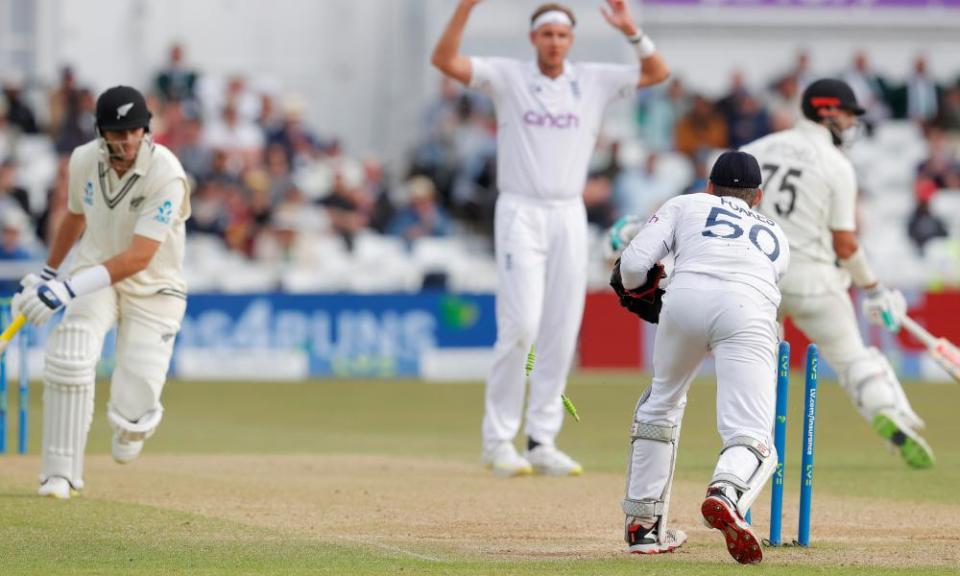England cut is harsh on Foakes but Bairstow decision offers Ashes clarity

Surrey didn’t hang about. Just 10 minutes after the England squad was announced, confirming Jonny Bairstow’s return behind the stumps for Ireland and thus the start of the Ashes summer, and with Ben Foakes missing from the list of 15 players, the club’s Twitter feed fired up in solidarity with the fall guy.
“The best keeper in the world was at it again last week,” read the pointed post, accompanied by a lightning emoji and a video of his silken glove work during the win against Middlesex. Alec Stewart gave Foakes that title a couple of years back and Ben Stokes, a Test captain not prone to hyperbole, has repeated it a good few times since.
But in the end, with Bairstow fit again and keeping for Yorkshire following that gruesome leg break, and his stand-in, Harry Brook, having scorched his way through the Test winter in truly eye-catching fashion, the panel had to find a way to accommodate the player who didn’t so much start the so-called Bazball revolution as blast it into orbit.
Related: Jofra Archer out of Ashes after recurrence of elbow stress fracture
They could have delayed the call, putting both men in the squad to face Ireland at Lord’s from 1 June. But while it has angered a good few supporters, tapping into that longstanding English debate about keepers and keeper-batters, Stokes, Rob Key, Brendon McCullum and co cannot be accused of dithering. Naming Dan Lawrence as the spare batter also means clarity for all concerned.
It is a pretty cruel blow for Foakes, although not as cruel as the news that Jofra Archer will be out for the rest of the summer after that expert-confounding elbow stress fracture recurred. This was the biggest gut punch in the press release and where the two parties go from here, central contracts and all, is far from straightforward.
But Foakes does have grounds to feel aggrieved. Over the past 12 months he has largely kept up those standards with the gloves, turned around the series against South Africa with a fine hundred at Old Trafford, and been one half of four century stands. As Key admitted, the 30-year-old has played a big part in the run of 10 wins from 12 Tests.

Equally, while upset, Foakes will not have been totally surprised. He has been here before, St Lucia in 2019 to be precise, when he was jettisoned for Bairstow before an Ashes summer. And during his media outings over the recent winter – a winter which included being left out to accommodate an extra fast bowler in Multan – there was admission that Bairstow’s return was likely and his best bet was not to stress it.
As Foakes broods, it may be that he rues that epic final-day defeat in Wellington in February where, having clawed England back into the chase, he holed out seven runs short of the target. Had he taken his team across the line, the agonising Key and his consiglieres experienced would have been greater still. This need not be the end, though, with injuries possible and his excellence on spinning tracks likely needed for the five‑Test tour of India next year.
Ben Stokes (Durham, captain), Jimmy Anderson (Lancashire), Jonny Bairstow (Yorkshire), Stuart Broad (Nottinghamshire), Harry Brook (Yorkshire), Zak Crawley (Kent), Ben Duckett (Nottinghamshire), Dan Lawrence (Essex), Jack Leach (Somerset), Ollie Pope (Surrey), Matthew Potts (Durham), Ollie Robinson (Sussex), Joe Root (Yorkshire), Chris Woakes (Warwickshire), Mark Wood (Durham).
Some will argue it didn’t have to be a binary decision. Zak Crawley’s lurching, too often flatlining, returns from opener would make him vulnerable in other sides. The notion of Stokes moving up felt fanciful, but Bairstow? He has opened just once in first-class cricket, admittedly, but given the job England are demanding at the top of the order, a personal view is his 50-over game could possibly have been transplanted.
Cricketers are not automata, however, and convincing Bairstow would not have been straightforward. It was probably too late in the project, not least given a venomous new‑ball attack such as Australia’s (no disrespect to Ireland). And McCullum, the head coach, has also been consistent that, for all his tactical innovation, crowbarring players into unfamiliar slots is not his style. Bairstow (or Brook) as opener would have been going against this principle; Bairstow as wicketkeeper is not.
Related: Leicestershire offer parable for English cricket: teams should serve, not just sell | Jonathan Liew
England have seemingly concluded that the potential power Bairstow offers with the bat at No 7 – along with more than competent keeping – makes him the option Australia would least prefer. The Yorkshireman may average just 26 in home Ashes but that century in Sydney in 2022, and that hot streak of four in five innings last summer, is more relevant. For all the disappointment over Foakes, it is not a selectorial Hail Mary.
Elsewhere, the squad largely picked itself given available resources. Jimmy Anderson is touch and go for Ireland – two weeks out is the chat – and Chris Woakes is a proven option behind Stuart Broad, Ollie Robinson and Matthew Potts. Mark Wood, the last of the fast men standing, has not played a first-class match since Pakistan but in recent times has shown he can tailor his preparation sufficiently without this.
Along with Bairstow’s return to the demands of a dual role so soon after a major injury, questions now surround whether Stokes is able to bowl, whether Brook can recapture his form after a struggle in the Indian Premier League, and whether this move to plump for almost outright aggression from one to seven in the lineup can work in the white heat of an Ashes contest. As ever, the beauty comes in finding out.

